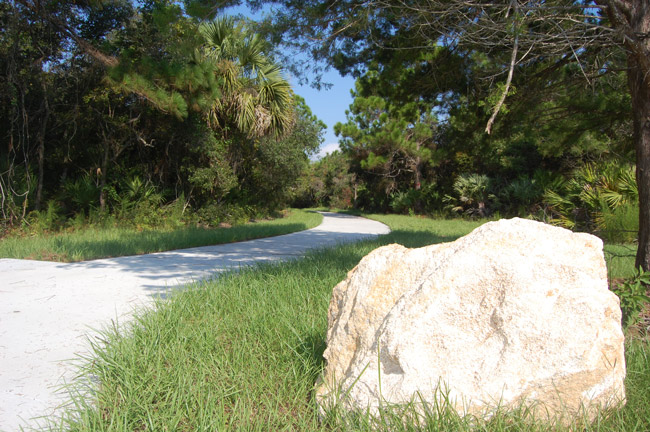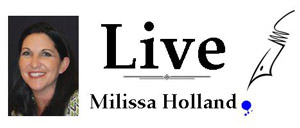Beyond Doctor?s Orders: When Health and Fitness Are Not Always a Matter of Choice
FlaglerLive | January 30, 2013

The road to health can be long, winding and rocky. (? FlaglerLive)
By Milissa Holland
It started with a text message: ?Do you guys want to be part of our team for this year?s Florida?s Obstacle Racing Challenge??
 Many of you know that for the past several years, my life was devoted to attending meetings rather then making exercise a priority. After looking at the photos that were sent about the race, I quickly realized that this wasn?t going to be easy. But nothing ever is that?s really worth it. So my husband and I didn?t hesitate. We accepted the challenge.
Many of you know that for the past several years, my life was devoted to attending meetings rather then making exercise a priority. After looking at the photos that were sent about the race, I quickly realized that this wasn?t going to be easy. But nothing ever is that?s really worth it. So my husband and I didn?t hesitate. We accepted the challenge.
Our journey to get in shape began last weekend: we can?t let our team down in May, especially because Steve and Cindy Cole?-my guests this Friday on Milissa Holland Live?are known for their competitive spirit on the racing circuit in Flagler. But it got me thinking about health, fitness and the roles we play as individuals, or sometimes have to play, with the cards we?re dealt.
As a county commissioner I spent hours analyzing our health care for our employees. We would be given trend lines and historical data from year to year. We went as far as opening a health care clinic specifically for county employees to reduce our costs overall. It was a wise investment, saving taxpayers well over $400,000 in the first year. Our main focus was developing preventive measures to manage the county?s long-term costs. We started a biggest-loser competition between departments. Our staff quickly trimmed down. You could feel the different energy when you walked into their offices. I saw firsthand what can happen when you focus and prioritize health and wellness as a means of reducing costs.
But something else occurred along the way. Beside the immediate cost savings and a much slimmer staff, what struck me the most was hearing about so many of our employees who were suffering with illnesses that would eventually cut down on their lifespan, cost a tremendous amount for medical care and compromise theirs and their families? quality of life.
Think about it. How many times did you hear of someone who has high blood pressure. Physicians always advise them to change diet and to exercise. I remember my father had a dangerously high cholesterol level. He began to completely change his diet but was very limited in terms of exercising due to his multiple sclerosis (MS). Down his cholesterol numbers went, but he added a few more vitamins and medicines to his diet.
How many of us know someone who is affected by diabetes? My grandfather was diagnosed very late in life but spent the remainder of his years injecting insulin into his system and monitoring his blood sugar count. All of these illnesses in my family drove the cost of medical care up substantially. Their recommended diets?you know the kind: fresher foods with very little processing?were much more costly.
Imagine what it must be like for those who can least afford it to deal with illness and take care of themselves, their diets, the costs associated with the healthier lifestyle their doctor recommends.
I have also spent a lot of time focusing on the hungry in our community. Our food banks and those who run them are among the best group of people I have known. And those who continually make contributions to the food banks are selfless human beings.
Now we know that Medicaid, the federal and state funded health insurance program for the poor, including the elderly poor, is the largest part of the state?s budget. Most can agree that it is not a sustainable system. It is growing exponentially. A lot of the beneficiaries of Medicaid are also among those who frequent our food banks. Which begs the question: why can?t our state government create a managed care system, and why does our federal government continue to institute policies in our agriculture industry that drives up the cost of food so much that these healthy alternatives to good eating habits are near impossible for those who can?t afford it? We know all this, we live through it, and yet very little happens to demand a change.
In the next few weeks I will be delving into this very complex topic here and on the radio. I believe it is entirely connected.
One good thing that I have noticed in the last few days of walking and running on the trails in Flagler is we have a lot of residents who love the outdoors. A very active community speaks volumes as to why so many people have decided to make this their home. I use an app to get myself motivated to get in shape. It?s called couch to 5k. Who knew I would rely on this device to dictate my daily regimen.
I look forward to hearing your thoughts in advance of Friday?s show but I also would love to hear your questions on fitness and healthy living for my special guests. Kelly Scully, part owner of PC Bike, with her husband Jake, are well known in the community for their Weekly Casual Rides?in which our residents are always invited to participate. Kelly Brandt is another guest who has inspired many to get in shape with her tough training standards. Jim Bowe will round out the panel discussion. He is the owner of Via Pure wellness and offers free health seminars. All are business owners in Flagler and are ready to talk about these issues and much more.
Join us.
![]()
Milissa Holland, a Flagler County commissioner from 2006 to 2012, is host of Milissa Holland Live on WNZF 1550 AM, Fridays at 10 a.m. Her column will appear here every Wednesday. Reach her by email here, on Facebook or on Twitter. While she?s on the air Friday morning between 10 and 11, call her at 386/206-WNZF (or 206-9693).


Source: http://flaglerlive.com/50353/health-fitness-mh/
academy awards 2012 albert nobbs a star is born oscar nominees oscar nominations 2012 kombucha tea separation of church and state







